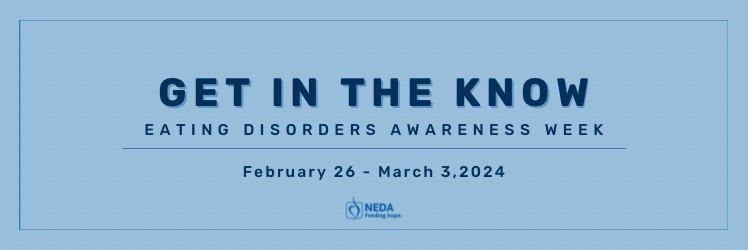While autistic self-advocates have created significant change, stigma and misinformation around autism and eating disorders still exist. With that in mind, the National Eating Disorders Association hosted an Autism Acceptance Month #NEDAchat, which explored common misconceptions about autism, barriers to treatment for eating disorders, and how those in the field can best serve those in the autistic community.
Our #NEDAchat panelists shared 13 ways that professionals can support autistic people living with eating disorders:
1. “Learn about autism. Adapt criteria for eating disorders and treatment to be applicable for us, and effective.” – Shawna Hinkle, @Soundless2 [For example, “1-on-1 therapy may be preferable to group.” – Shain Neumeier, @smneumeier]
2. “Listen to us. Treat us as individuals. Talk to us, not our caregivers. Don’t judge. Don’t lecture. Just listen.” – Ashlea McKay, @AshleaMcKay
3. “Allies in the eating disorders field practice true inclusion when they don’t claim their opinion supersedes autistic opinions.” – Autism Women’s Network, @autism_women
4. Be mindful that “way too many autistic people have trauma and complex trauma from ‘therapy’ and ‘treatment,’ which makes it super hard to access.” – Lydia X. Z. Brown, @autistichoya
5. “Don’t require that autism traits be eliminated to consider progress on the eating disorder. The ED is the problem, NOT autism!” – Autistic Self-Advocacy Network, @autselfadvocacy
6. “Also, treat sensory issues as things you need to work around unless the individual initiates. It’s similar to respecting religious dietary restrictions during ED treatment – they don’t get thrown out the window; instead, you work to have a healthy relationship with them, not excuses.” – Autistic Self-Advocacy Network, @autselfadvocacy
7. “Don’t assume based on outward signs or behaviors. Don’t jump to conclusions. Honor my complexity.” – Chrysanthe Tan, @ChrysantheTan
8. “Don’t press autistic people to try new foods we say NO to!” – Shain Neumeier, @smneumeier
9. “Be inclusive of trans/nonbinary autistic people.” – Daniel Alexander, @xandernaut
10. “Understand MASKING, what it means, and the difficulties it causes with communicating effectively.” – Carrie Beckwith-Fellows, @RuralTeacake
11. “Implement more picture-based support literature and study material for visual thinkers/processors…” – Carrie Beckwith-Fellows, @RuralTeacake “…and plain language, too. Autistics with intellectual disabilities exist and aren’t immune to EDs, either!” – Autistic Self-Advocacy Network, @autselfadvocacy
12. “Crucial: If you’re a professional helping an autistic person with an ED, help them come up with a plan they’re comfortable with.” – Chrysanthe Tan, @ChrysantheTan
13. “Meet people where they’re at and don’t assume bad faith (laziness, stubbornness, etc.). Heating up microwaveable food two times a day might be the limit of a person’s self-care skills.” – Shain Neumeier, @smneumeier
For a recap of our full Autism Acceptance Month #NEDAchat, click here. To learn more about autism, please visit autisticadvocacy.org and autismwomensnetwork.org.





